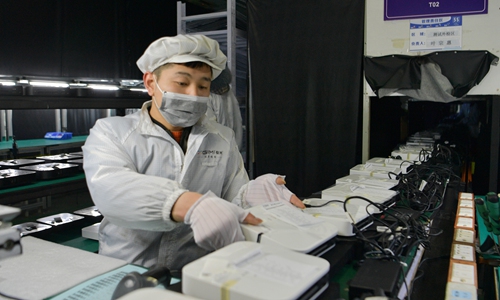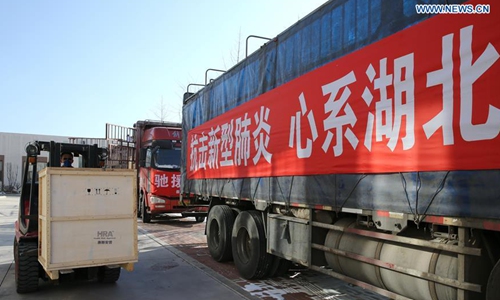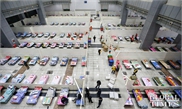Coronavirus outbreak dries up major Chinese cities’ labor pools
‘Second wave’ of hits on economy will be under control in short-term: analysts

A worker from Gimi, a technological company, gives a final check on a production batch in Chengdu, Southwest China's Sichuan Province on Thursday. Some companies located in the high and new technology industrial area in Chengdu started operation in accordance with safety prevention work against the novel coronavirus. Photo: cnsphoto
The outbreak of the novel coronavirus has prompted numerous companies to further extend the dates that employees return to work in first-tier cities across China, a trend which some industry insiders described as a "second wave" of hits on the Chinese economy that would dry up major cities' labor pools in manufacturing, services, construction and other sectors while also causing inconveniences to people's daily lives.
But as China is fighting the deadly virus with swift action and resolute measures, and as numerous policies to ease enterprises' burdens are in the pipeline, Chinese analysts said that the impact is likely to be controlled within the first quarter, leaving enough time for various industries to rebound for the rest of the year.
As part of the stringent steps to prevent the spread of the epidemic, Chinese local authorities have imposed unprecedented restrictions on population mobility. A number of first-tier cities including Beijing and Shanghai have suspended certain public transportation services such as cross-region buses. Checkpoints are also being set up to discourage inbound and outbound population flow.
A migrant worker surnamed Chen in Zhumadian, Central China's Henan Province, who makes a living by serving as a porter at a construction site in Guangzhou, South China's Guangdong Province, told the Global Times on Wednesday that he had planned to return to work in mid-February but now has to give up his plans as the village head will not allow him to return until the coronavirus is under control.
"My backup plan is to work on nearby local sites, or start farming again," Chen said.
Chen is not alone. Large legions of migrant workers, as well as white-collar employees that work in China's first-tier cities who went back to hometown for the Spring Festival break, are trapped in their hometowns because of the sweeping quarantine measures. Also, some people told the Global Times that worries over infection during trips also prompted them to halt their plans to go back to work.
It is not exactly clear how much of the country's 288 million migrant workers, which account for one third of China's total labor force, remain stuck. But a labor shortage issue seems to be haunting major Chinese cities including Beijing, Shanghai, Guangzhou and Shenzhen, where demands for workers have been climbing in recent years amid boom of manufacturing and service sectors.
According to data released by Beijing's transportation authority on Tuesday, among the 10 million people that left the capital ahead of the Spring Festival holidays, 8 million still have not returned.

Workers load medical devices onto a truck in Qinhuangdao, north China's Hebei Province, Feb. 5, 2020. Two vehicles carrying ten medical devices donated by a medical system enterprise in Qinhuangdao set out to help hospitals in Xianning City of Hubei fight against novel coronavirus outbreak. (Xinhua/Yang Shiyao)
Labor shortagesWorries have been growing amongst business owners as the date of work and factory resumption approaches. Most Chinese cities, except the most hard hit regions by the coronavirus, request work be restarted on February 10.
Duan Lianmin, chairman of a glass factory in Shenzhen, lamented that her company is having a more difficult year recruiting workers compared with previous years.
"Labor shortages have always been an issue after the Lunar New Year holidays…But the virus exacerbates our woes," Duan told the Global Times on Wednesday.
Duan said she doesn't know how many workers will return to resume their duties by February 10, the time her factory reopens. "The only thing I know is that if there's not enough workers, the production line cannot run at its full capacity and I may not be able to catch up with incoming orders," she said.
The disruptions, which some analysts described as "the second wave of blows to the Chinese economy" after consumption was first hit, are not only limited to traditional manufacturing industries.
Other services sectors including logistics, catering, hotels, lodging and restaurant industries which affect local residents' different aspects of lives, are also on the list to digest the fallout of a labor shortage.
A Beijing-based white collar worker surnamed Shen told the Global Times that delivery services have been "quite slow" due to the shortage of couriers. She also complained about a 50-percent surge regarding delivery costs on online food orders in recent days.
Analysts said that the persistent labor shortages could also cast a shadow on infrastructure investments, some of which are led by government plans and are deemed as key driving factors for economic growth in big cities.
"The lack of construction workers is of course a headache. But as government departments are also running short of hands, officials will prioritize tackling the virus over other projects, such as stabilizing fixed-asset investments," Wang Jun, deputy director of the Department of Information at the China Center for International Economic Exchanges, told the Global Times on Thursday.
However, analysts still remain bullish on how the economies in Chinese first-tier cities will be affected by its vast labor shortages once the epidemic is eradicated. Wang said that labor shortage issues, which he predicts can be eased in the first quarter, will only affect a slice of the economies of major cities, but not hit at the very heart of them.
So far, a number of major cities in China have announced policies to delay social security payments and lower loan interest rates for affected enterprises.
Beijing announced on Thursday a batch of measures to support small- and medium-sized enterprises, including exemption of rental fees, credit line support and subsidies to their costs in research and development.
"It is a tough time, but the sacrifice is for the future to be better-off," Wang said. "The waning economy in the first quarter will be remedied with more hard-work in the rest of the year."
China reported 28,018 confirmed cases of the coronavirus infection as of 12pm Wednesday, with the death toll reaching 563.



